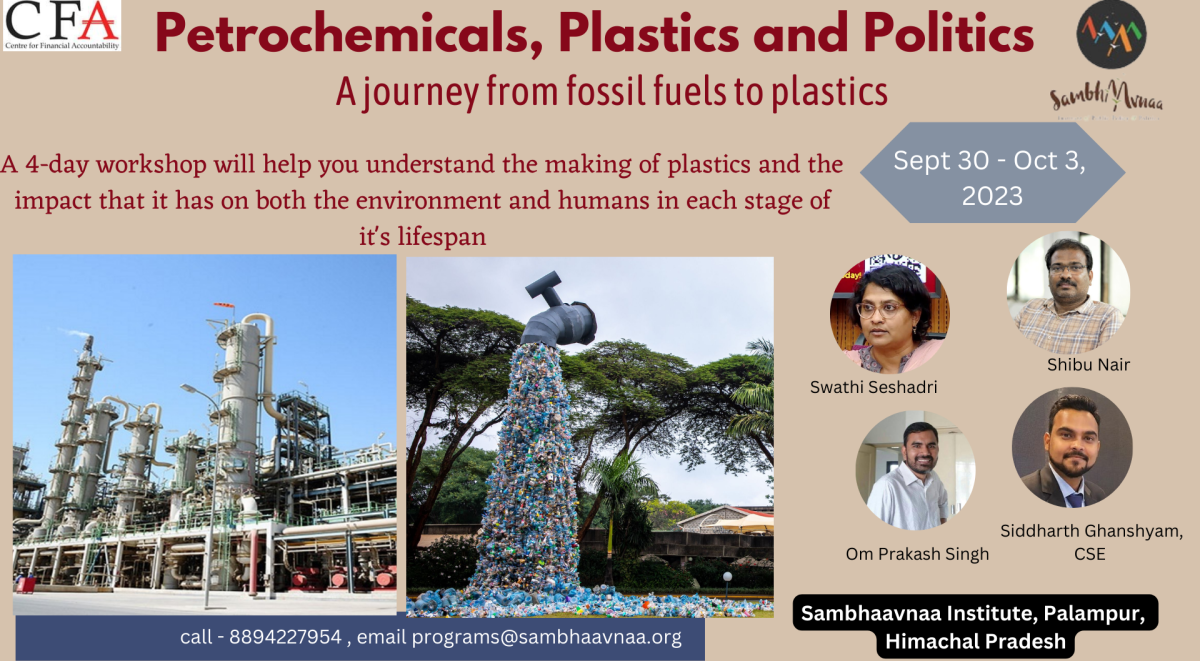September 30 – October 3, 2023
Big money is set to fuel the making of more plastics in India. The production of phenolics in India began in 1947 and the first thermoplastics (polystyrene) were made in 1957 (PlastIndia, 2019). In 2018-19, the production of plastics in India was 170 lakh tons (PlastIndia, 2019). According to the same report, the industry size was INR 5.1 lakh crore with around 4,000 converting units in operation in 2018-19.
The industry has shown consistent growth of 3.4% a year and is predicted to maintain an annual growth rate of 3.4% until 2028. Interestingly, since 1990, India’s GDP growth rate has shown a consistent dependence on plastic consumption. As our plastics consumption fell in the last decade, so did the country’s Gross Domestic Product (GDP) growth rate. While the nature of this correlation is worth a closer look, the fact itself is used by the government and the plastics industry to link plastics consumption with India’s progress and development. While plastics consumption in 2011 grew only by 2.5% in the UK and 10% in China, India showed a growth rate of 16%.
Turning off the tap in plastics would necessarily entail ending the production of raw materials used to produce these. The polymer industry is characterized by a few oligarchs who control not only the polymer industry but also the downstream production of plastics and how they are disposed of. This control encompasses the narrative in the media and also policies. It is imperative therefore that this segment of the polymer industry be held accountable for the implications of their businesses.
Currently, the FMCG MNCs refuse to publicly share the number of sachets that they sell in any of their markets/territories. At the same time, most of them have announced targets for reducing their use of plastic in packaging and recycling certain quantities of this sold plastic.
The harmful impacts of plastic use and the pollution caused in its disposal phase are well documented. What needs specific attention though is the impacts of plastic production on people, the environment, and the climate.
About the Workshop
CFA and Sambhaavnaa Institute offer this workshop to help participants understand the relationship between fossil fuels and plastics. It also aims to help the participant understand what it takes to make plastics and the impact that it has on both the environment and humans in each stage of its lifespan: from oil exploration, transportation of crude oil, refining, manufacturing of petrochemicals (which are the raw materials for plastics), and the production of plastics.
The workshop will help participants explore these issues from the perspective of social and environmental justice. Evidence and data offered in this workshop will help build the participant’s knowledge on the themes covered. Participants skills necessary for participants to engage on this issue once they return will be built.
Learning Goals
- Develop a critical perspective of the plastics lifespan including the state-industry nexus
- Understand the relationship between fossil fuels and plastics
- Critically analyze how systems and policies sideline the environmental and social impacts of the petrochemical and plastics industry in favor of private profit-driven approaches.
- Understanding of the impacts along the plastic’s lifespan
Methodology
The program shall use a variety of methodologies including interactive lectures and discussions facilitated by subject experts, live experience sharing by activists, film screenings and collective reflection, readings and presentations, and group and individual exercises, amongst others, to enable participants to reflect on their current understanding and help deepen the same.
Themes that will be covered
- Oil and Gas Exploration
- Extraction, Imports, Consumption, Refining, Uses
- Policy regime governing oil and gas
- Pricing, taxes, subsidies
- Polymer Industry
- Plastics life cycle: Petrochemicals to plastics, global trends
- Polymer industry in India
- Who is financing polymers?
- Impact of polymer production on communities and workers
- Plastics Industry
- Plastics industry: structure, products, volumes
- Chemicals in plastics: science, health, and environmental impacts
- Single-use plastics: sachets, FMCGs, policy
- Plastic waste management
- Post-consumption management of plastics
- Overview of false solutions
- Waste to Energy: science, industry in India, impacts
- Overarching issues
- Global policy regime
- Just Transition in the petrochemicals and plastics industry
To learn more about the workshop and to apply, click here.

